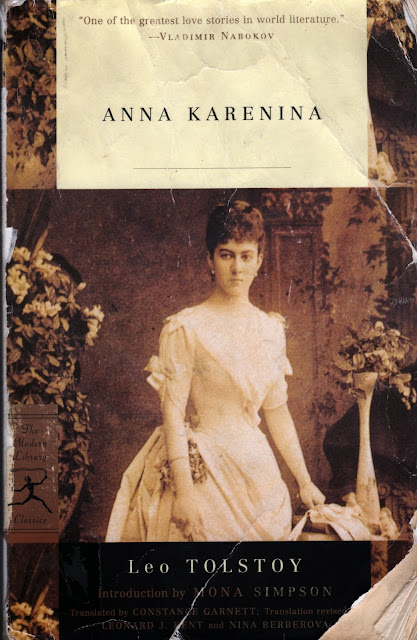Born That Way OR Commonality and Compassion
One of the items on my Life List for this year was to read at least one book every two weeks. I've been in school so long and had required reading that has left me with little space to read for general enjoyment, so I wanted to catch up a little on my game this year! This week I finished Dorothy Parker's Complete Stories and started Leo Tolstoy's Anna Karenina. I found it on some book list that had computed ask the most popular book lists and it said that, due to the number of lists that included this title and how far up on the rankings, it was the number one recommended book for a person to include on their list of works read. Well, numbers don't lie, so I'm reading it! And it has held my interest from the start.
I'm about a hundred twenty pages or so in, and one of the characters is on his way to visit a wayward brother he hasn't seen in a while, and considering all the misdeeds that brother has done, from benign drunkenness to beating young children, attempting to swindle money from another brother in court, and assaulting village elders, among many other things. And then the character, Levin, thinks the following:
"It was all horribly disgusting, yet to Levin it appeared not at all in the same disgusting light as it inevitably would to those who did not know Nikolay, did not know all his story, did not know his heart.
"Levin remembered that when Nikolay had been in the devout stage, the period of fasts and monks and church services, when he was seeking in religion a support and a curb for his passionate temperament, everyone, far from encouraging him, had jeered at him, and [Levin] too, with the others. They had teased him, called him Noah and Monk; and, when he had broken out [into all sorts of senseless debauchery], no one had helped him, but everyone had turned away from him with horror and disgust.
"Levin felt that, in spite of all the ugliness of his life, his brother Nikolay, in his soul, in the very depths of his soul, was no more in the wrong than the people who despised him. He was not to blame for having been born with his unbridled temperament and his somehow limited intelligence. But he had always wanted to be good. ..."
Now, I do believe in such a thing as moral responsibility for one's own actions, but I love this little except from Tolstoy's book, in that it considers what makes a person behave in a certain way. I'm sure you've all had discussions at some point or other about how some people respond to tragedy and injustice by becoming stronger/better, and some people seem to either develop a victim mentality or just respond in what we might consider a "negative" way.
I think at various times I have responded to my own trials in both manners. And, truth be told, there have been times when I have honestly wondered, "What is the point in even trying anymore?" I guess a lot of people would consider me weak. Or even bad. Who knows?
But that's one of the things that appeals to me about Jesus. He doesn't just look at my weaknesses; He knows their causes. And yeah, He encourages me to do and be better, and in encouragement we so often find strength to do what is encouraged. Thank God for his grace.
But let us remember, people respond to grace in different ways, too, whether receiving it freely or thinking, "What's the catch?" or rejecting it because of feelings of unworthiness. Can we not be more compassionate with people? I think Jesus is.
I am not sure whether, over the course of Tolstoy's book the characters will change, either for better or for worse, or whether forgiveness might be one of the themes of the book (as it has already been a subject of discussion between two of the main characters). But I think perhaps it is a theme of life in general, and maybe that is why it is so emphasized by the gospel. Life consists of constantly and fluidly learning to live with and love others despite, and in many cases, because of, their limitations and/or weaknesses.




I'm a big fan of Russian Classics, and Anna Karenina is one of the very best. If you like it, you should check out War and Peace and The Sevastopol Stories (should be an intersting read right now, with the recent Russian re.annexation of Crimea ) by Tolstoy. Best of the best, however, are the books by Dostoyevsky >:)
ReplyDeleteCold As Heaven
Thank you for the recommendations - I will have to check out Dostoyevsky! I also bought a book of Russian Fairy Tales I can't wait to read....
DeleteI'll send you my top-ten list of Russian Classics, and then you will get hooked >;)
DeleteThis is one on my TBR list. Unlike CA Heaven, above, I don't think I have read any of the Russian classics, so I am not sure how I will feel about it, but, as you said, it shows up on so many of those "must read" lists and my best friend raved about it as well, so it is definitely on my someday list! Happy reading!!
ReplyDeleteEnjoy your new found read! I think you will enjoy the way it all ties together and leaves the reader asking deeper questions about their own character and genuineness. At least that's how the book impacted me.
ReplyDeleteI have not read this either, but it is also on my list.
ReplyDelete--
Timothy S. Brannan
The Other Side, April Blog Challenge: The A to Z of Witches
Ask an Atheist Day